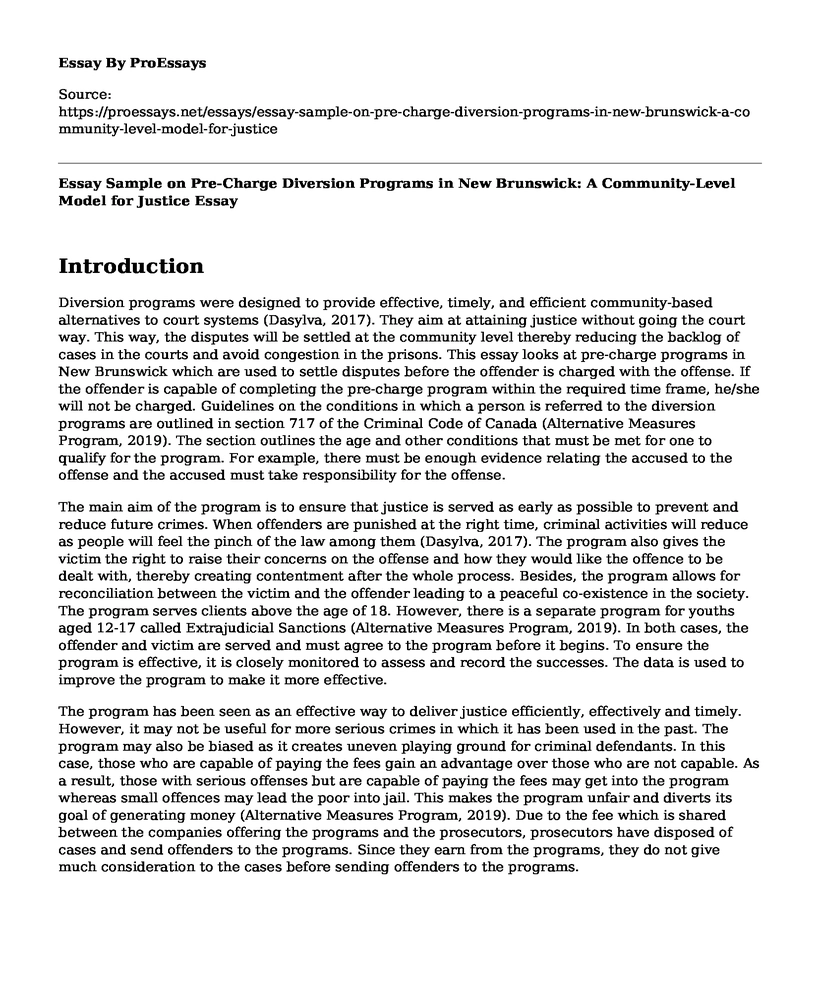Introduction
Diversion programs were designed to provide effective, timely, and efficient community-based alternatives to court systems (Dasylva, 2017). They aim at attaining justice without going the court way. This way, the disputes will be settled at the community level thereby reducing the backlog of cases in the courts and avoid congestion in the prisons. This essay looks at pre-charge programs in New Brunswick which are used to settle disputes before the offender is charged with the offense. If the offender is capable of completing the pre-charge program within the required time frame, he/she will not be charged. Guidelines on the conditions in which a person is referred to the diversion programs are outlined in section 717 of the Criminal Code of Canada (Alternative Measures Program, 2019). The section outlines the age and other conditions that must be met for one to qualify for the program. For example, there must be enough evidence relating the accused to the offense and the accused must take responsibility for the offense.
The main aim of the program is to ensure that justice is served as early as possible to prevent and reduce future crimes. When offenders are punished at the right time, criminal activities will reduce as people will feel the pinch of the law among them (Dasylva, 2017). The program also gives the victim the right to raise their concerns on the offense and how they would like the offence to be dealt with, thereby creating contentment after the whole process. Besides, the program allows for reconciliation between the victim and the offender leading to a peaceful co-existence in the society. The program serves clients above the age of 18. However, there is a separate program for youths aged 12-17 called Extrajudicial Sanctions (Alternative Measures Program, 2019). In both cases, the offender and victim are served and must agree to the program before it begins. To ensure the program is effective, it is closely monitored to assess and record the successes. The data is used to improve the program to make it more effective.
The program has been seen as an effective way to deliver justice efficiently, effectively and timely. However, it may not be useful for more serious crimes in which it has been used in the past. The program may also be biased as it creates uneven playing ground for criminal defendants. In this case, those who are capable of paying the fees gain an advantage over those who are not capable. As a result, those with serious offenses but are capable of paying the fees may get into the program whereas small offences may lead the poor into jail. This makes the program unfair and diverts its goal of generating money (Alternative Measures Program, 2019). Due to the fee which is shared between the companies offering the programs and the prosecutors, prosecutors have disposed of cases and send offenders to the programs. Since they earn from the programs, they do not give much consideration to the cases before sending offenders to the programs.
Conclusion
In conclusion, the pre-charge diversion of cases is important in ensuring justice is served with minimal delays as possible. The program also allows for reconciliation hence a peaceful co-existence in the society. However, the fee involved is slowly diverting the objective of the program, making it a source of income for the companies and the prosecutors. The money factor makes the poor miss out on the important factor despite the less offensive their charges are. It has also led to rich people with serious crimes to escape court proceedings and in turn, they are directed to the programs. It is, therefore, necessary to review the policies governing the program to ensure it functions effectively and efficiently.
Works Cited
Alternative Measures Program. (2019, September 20). Retrieved from https://www2.gnb.ca/content/gnb/en/services/services_renderer.201055.Alternative_Measures_Program.html#serviceDescription
Dasylva, W. (2017). An examination of the use of alternative dispute resolution processes in Canadian mergers & acquisitions practice (Master's thesis). Retrieved from https://mspace.lib.umanitoba.ca/xmlui/handle/1993/32267
Cite this page
Essay Sample on Pre-Charge Diversion Programs in New Brunswick: A Community-Level Model for Justice. (2023, Mar 27). Retrieved from https://proessays.net/essays/essay-sample-on-pre-charge-diversion-programs-in-new-brunswick-a-community-level-model-for-justice
If you are the original author of this essay and no longer wish to have it published on the ProEssays website, please click below to request its removal:
- Distributive Justice
- The National Rifles Association Analysis
- Essay Sample on Marijuana Legalization in the US
- Essay Example on Adversarial System: Prescribed Processes for Justice
- Essay Example on Jury Deliberation: A Proven System of Fairness and Efficiency
- Rights: Inherent Freedoms Beyond Borders, Discrimination and Barriers - Essay Sample
- Report Example on Same-Sex Marriage & Masterpiece Cakeshop: A Religious Standoff







